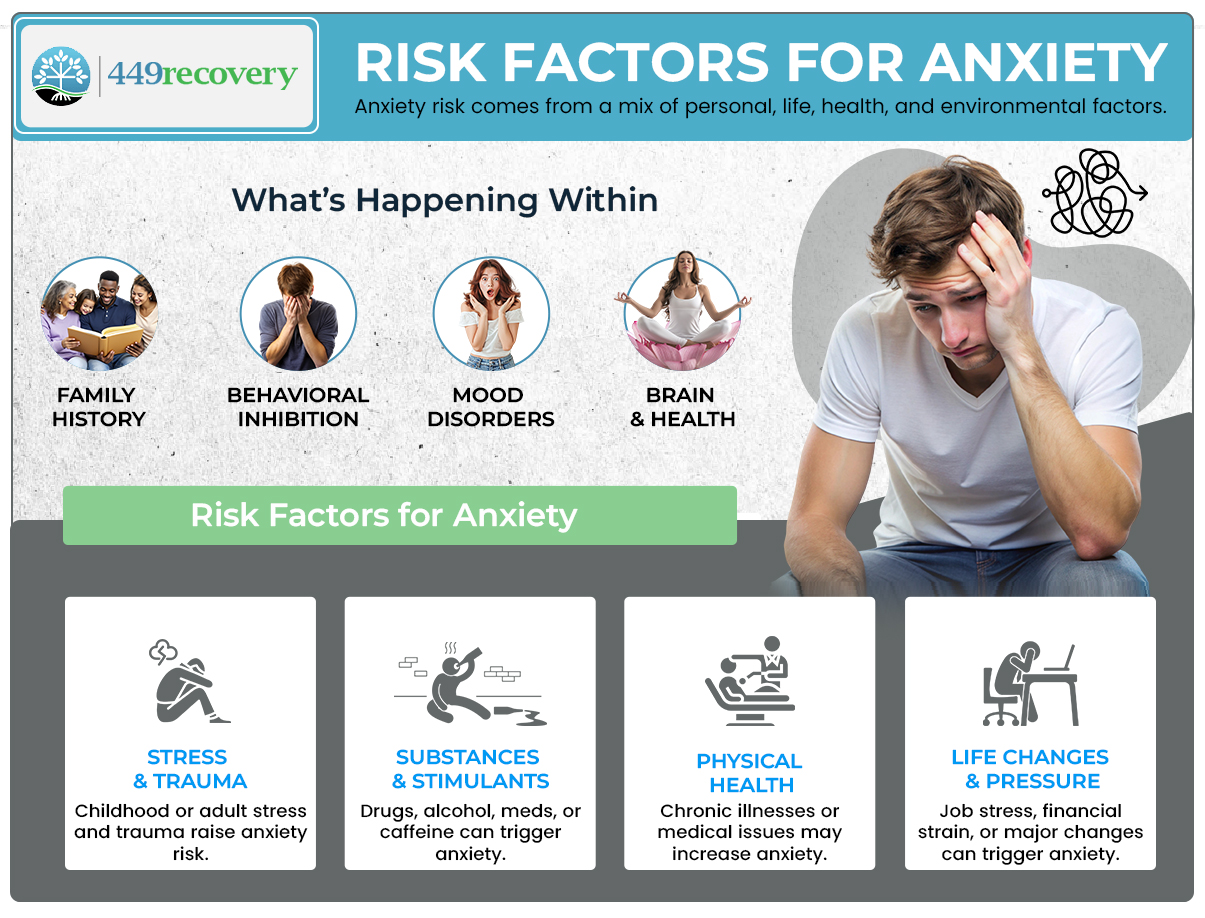Daily life can be stressful, and a certain amount of anxiety is normal. However, anxiety disorders are much more serious than normal worries about finances, relationships, or work. For those with anxiety disorders, the feeling of anxiety is persistent, often increasing over time. This can have a significant impact on daily life, negatively affecting jobs, employment opportunities, job performance, and relationships. Getting treatment from a reputable recovery center like 449 Recovery is essential.
449 Recovery provides specialized anxiety treatment in Orange County, serving the needs of the local community. We offer specialized anxiety treatment for both men and women, emphasizing gender-specific approaches. Anxiety is a significant concern in Orange County, and local resources like 449 Recovery are available to help.

The consistent feeling of anxiety and worry can be uncomfortable and crippling, impacting those experiencing it and their loved ones. Anxiety can influence behavior, often leading to avoidance or other actions that affect daily life. Anxiety disorders are very common, and most people experience some form of anxiety or worry in their lives. About one-third of all people will suffer from some debilitating anxiety in their life. Each case of anxiety is unique and may require a personalized treatment approach. There are different types of anxiety disorders; they include the following:
Generalized Anxiety Disorder
Generalized anxiety disorder (GAD) is diagnosed when symptoms of excessive anxiety and worrying are present most days for at least six months. GAD is a form of chronic anxiety, meaning it involves persistent and long-lasting feelings of anxiety that can disrupt daily life. People with GAD experience excessive worry about everyday things such as health, responsibilities, errands, and minor personal matters, which can interfere with daily functioning.
The worries and stress are recurrent and not tied to specific events. While it is normal to feel some sense of restlessness, GAD is debilitating due to the ongoing and intense feelings of anxiety and worrying. Individuals with GAD tend to worry excessively, even about minor matters, and are often worrying constantly, even when there is little reason to worry.
Symptoms of GAD include:
- Feeling restless or wound up
- Difficulties focusing, making it hard to concentrate on daily tasks
- Irritability
- Feeling easily fatigued
- Having pain that can include headaches, muscle aches, or stomach aches
- Having difficulty falling or staying asleep, or experiencing poor sleep quality
- Increased levels of stress hormones
- Changes in the amygdala and hippocampus
Coping strategies, such as relaxation techniques and therapy, are important for managing GAD symptoms. One benefit of treatment is the improvement in overall well-being and daily functioning. GAD often co-occurs with depression, and both conditions should be addressed in treatment.
Symptoms can vary in severity. It is important to see a licensed professional if you are concerned about yourself or a loved one.
Contact 449 Recovery Today!
Find The Help You Need By Reaching Out To Us Today!
Panic Disorder
A panic attack is a sudden episode of intense fear that can feel paralyzing. Those with panic disorder experience frequent and unexpected panic attacks. Not everyone who experiences panic attacks will develop a panic disorder. Panic disorder can also involve severe anxiety that disrupts daily functioning. Symptoms of a panic attack may include some of the following:
- Sweating
- Tingling
- Pounding and/or racing heart
- Chest pain
- Shortness of breath
- Feelings of doom
- Sense of not being in control
Panic attacks are very uncomfortable and, for those with panic disorder, it can be terrifying to not know when the next one will happen. Some may have multiple panic attacks per day, while others may only have a few a year.
Social Anxiety Disorder
It is typical to feel discomfort in new social settings. However, those with social anxiety disorder, also known as social phobia, experience intense fears of embarrassment or judgment in social situations. Individuals with social anxiety disorder are often afraid of being humiliated or embarrassed in social situations. These fears can become so overwhelming that individuals often avoid social interactions, such as public speaking or meeting new people, to cope with their anxiety. Symptoms of social anxiety disorder may include:
- Racing or pounding heart
- Blushing or sweating
- Stomach ache
- Feeling judged by others or self-conscious
- Difficulty making eye contact
- Rigidness when speaking to those they don’t know well
- Soft-spoken voice
It is normal to feel some sense of discomfort in new social situations, but social anxiety disorder is different. People with social anxiety disorder may avoid social interactions due to the fear of possibly being judged, rejected, or humiliated. Social phobia is characterized by persistent and intense feelings of anxiety and fears in social situations, which can inhibit a person’s ability to function normally.

Phobia-Related Disorders
A phobia is an intense and often unrealistic fear, involving exaggerated fears related to a specific situation or item. Symptoms can include:
- Uncontrollable worry or fear about an object or situation
- Avoiding certain objects or situations due to fears
- Immediate and deep feelings of anxiety after being around a situation or object
- Having anxiety or fears over an object or situation without any way to change it
There are multiple kinds of phobias, including fear of certain spaces, animals, objects, or situations. However, all phobias can greatly affect someone’s life, as they are unable to control a feeling of panic
Separation Anxiety Disorder
People with separation anxiety disorder fear being separated from another person or people to whom they are attached. There is commonly a feeling of anxiety about something bad happening to their loved one while separated. This can lead to avoiding being separated from those they are attached to, which can create issues with work and relationships.
Separation anxiety disorder can also affect the relationship between the individual and a family member, making it important for family members to provide understanding and support during difficult times.
While this is often considered a problem for children, adults can also be diagnosed with separation anxiety disorder. Children and adults can feel physical symptoms as a result of separation anxiety.
Risk Factors for Anxiety

Anxiety is a combination of genetic and environmental factors. There are different types of anxiety, but there are some common risk factors for anxiety in general. They include:
- Shyness
- Discomfort in new situations, especially as a child
- Being exposed to stress or negative events
- Family history of anxiety or other mental illness
Anxiety often co-occurs with other mental disorders, so comprehensive dual diagnosis treatment should address all relevant conditions. Support from family and friends is also important in reducing the risk of developing anxiety.
Anxiety disorders can also be affected by:
- Physical health conditions, including issues with the thyroid or heart rhythm
- Caffeine or other medications that impact mood and energy
Anxiety and Substance Use Disorder
There are a variety of reasons why someone can be affected by an anxiety disorder. For some, a combination of family history, trauma, and/or medication can create or exacerbate issues with anxiety. Regardless, anxiety is a common and serious mental health condition, and it must be treated at a trusted recovery facility.
Some may self-medicate to treat or manage their anxiety symptoms. Individuals with anxiety disorders, such as generalized anxiety disorder or social anxiety disorder, may turn to alcohol as a way to self-medicate and manage their symptoms, which can increase the risk of developing substance use disorder. Utilizing substances to change how they feel on a regular basis is dangerous and can lead to substance use disorder (SUD). Treatments at 449 Recovery include dual-diagnosis – the treatment of two mental health conditions at once. This can include anxiety and SUD. Options for treatment vary depending on each person, and finding the right treatment is very important.
Treatment for anxiety often involves psychotherapies and talk therapy as first-line approaches, focusing on awareness, acceptance, and making healthy adjustments. In severe or complex cases of anxiety and substance use disorder, residential treatment may be recommended as an initial or intensive level of care.

Chronic Pain and Anxiety
Chronic pain and anxiety disorders often go hand in hand, creating a challenging cycle that can be difficult to break. Many people suffering from chronic pain find themselves developing an anxiety disorder, as the ongoing discomfort and limitations can lead to constant worry and distress. Likewise, those already living with anxiety are more likely to experience chronic pain, as anxiety can heighten the body’s sensitivity to pain and contribute to physical tension.
This close relationship between chronic pain and anxiety means that both conditions can make each other worse over time. For individuals dealing with both disorders, daily life can become overwhelming, with physical suffering fueling emotional distress and vice versa. That’s why it’s essential to seek treatment approaches that address both anxiety and chronic pain together. Comprehensive care that targets both the mind and body can help break the cycle, reduce suffering, and improve overall well-being. If you or a loved one is struggling with chronic pain and anxiety, know that effective treatment is available, and recovery is possible.
Supporting Loved Ones
Supporting a loved one with an anxiety disorder can feel overwhelming, but your encouragement makes a real difference. Whether they’re facing generalized anxiety, panic disorder, or another form of anxiety, a safe, non-judgmental environment helps them open up and seek treatment.
Gently encourage therapy or professional support, and remind them that small steps forward matter. With guidance, people with anxiety can build coping strategies, manage symptoms, and regain confidence.
Remember to care for yourself, too—setting boundaries and practicing self-care allows you to be a stronger support system. Families in Orange County also have access to therapy, workshops, and support groups that provide tools for healing together.
If you or a loved one is struggling with anxiety, help is available. Reach out today to begin the path toward relief and recovery.
Anxiety Treatment at 449 Recovery
Finding a treatment program you can trust is important to develop peace and healing from anxiety. At 449 Recovery, we utilize evidence-based practices tailored to the client’s individualized needs and symptoms. Our treatment includes teaching coping skills to help manage anxiety symptoms effectively.
Treatment may include cognitive-behavioral therapy (CBT), trauma therapy, psychotherapy, family sculpting, and more. Anxiety can be treated, and we are here to help. You can trust us to help you discover treatment options that really work.
Anxiety is a serious mental disorder that is very common. At 449 Recovery, we offer treatment options to help you find freedom in your life. We proudly serve clients throughout Orange County. Contact us today to find out more about how we can help you or your loved one.
Dr. Sharif is a Licensed Marriage and Family Therapist who joined 449 Recovery in 2020 and oversees clinical operations as the Chief Clinical Officer. He earned his B.A. in Psychology and M.S. in Clinical Psychology from Vanguard University and completed his Doctor of Psychology from California School of Professional Psychology. Since 2011, Dr. Sharif has been dedicated to helping individuals, couples, and families heal from co-occurring disorders, including mental health, relational, and substance use challenges. He has led workshops on family dynamics, attachment injuries, spirituality in sobriety, and the impact of trauma on relationships.





